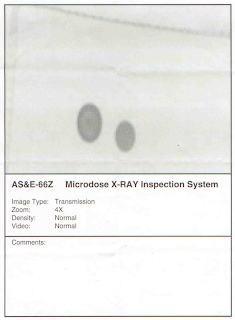Russian Embassy Bugging Documents Released
By on 16/11/2010
By on 16/11/2010
Careless people often blab information, forget to secure it, toss it in the garbage can, or otherwise lose it—hundreds of laptops are lost every day. People also steal it when they become greedy, spiteful, conned, blackmailed, or caught up in a “cause.”
Investigating an information loss, however, begins with an electronic surveillance detection audit.
Here’s why…
• Serious espionage will include electronic surveillance.
• The possibility must be resolved before accusing people.
• Bugging is the easiest spy technique to discover.
• Electronic surveillance evidence helps prove your case.
Best advice… Conduct audits on a regular basis. Uncover signs of espionage during the intelligence collection stage, before your information can be abused. (more)
 “I think of all of the trinket type things we’ve accumulated over the years, the spy coin is *by far* the coolest, and is made even cooler with the background story provided on the chip!!
“I think of all of the trinket type things we’ve accumulated over the years, the spy coin is *by far* the coolest, and is made even cooler with the background story provided on the chip!!
Several agents commented on how well it was made, and how hard it would be to detect such a thing.“
By on 28/10/2010
Researchers at the University of Pennsylvania say they’ve discovered a way to circumvent the networking technology used by law enforcement to tap phone lines in the U.S.
The flaws they’ve found “represent a serious threat to the accuracy and completeness of wiretap records used for both criminal investigation and as evidence in trial,” the researchers say in their paper, set to be presented Thursday at a computer security conference in Chicago.
Following up on earlier work on evading analog wiretap devices called loop extenders, the Penn researchers took a deep look at the newer technical standards used to enable wiretapping on telecommunication switches. They found that while these newer devices probably don’t suffer from many of the bugs they’d found in the loop extender world, they do introduce new flaws. In fact, wiretaps could probably be rendered useless if the connection between the switches and law enforcement are overwhelmed with useless data, something known as a denial of service (DOS) attack. (more)
By on 12/10/2010
An Akamai Technologies Inc. employee was arrested and charged Wednesday with allegedly providing confidential business information over an 18-month period to a person he believed to be an agent of a foreign government.
Elliot Doxer, 42 years old, was charged in a complaint with one count of wire fraud, according to the Justice Department. The complaint alleges that on June 22, 2006, Mr. Doxer, of Brookline, Mass., sent an email to a foreign country’s consulate in Boston stating that he was willing to provide any information that he had access to that might help the country.
It is alleged that in later communications, Mr. Doxer said his chief desire “was to help our homeland and our war against our enemies.” He also allegedly asked for $3,000 in light of the risks he was taking.
The unnamed foreign government cooperated with the U.S. in the investigation. A Justice Department spokeswoman wasn’t immediately available to comment. (more)
By on 08/10/2010